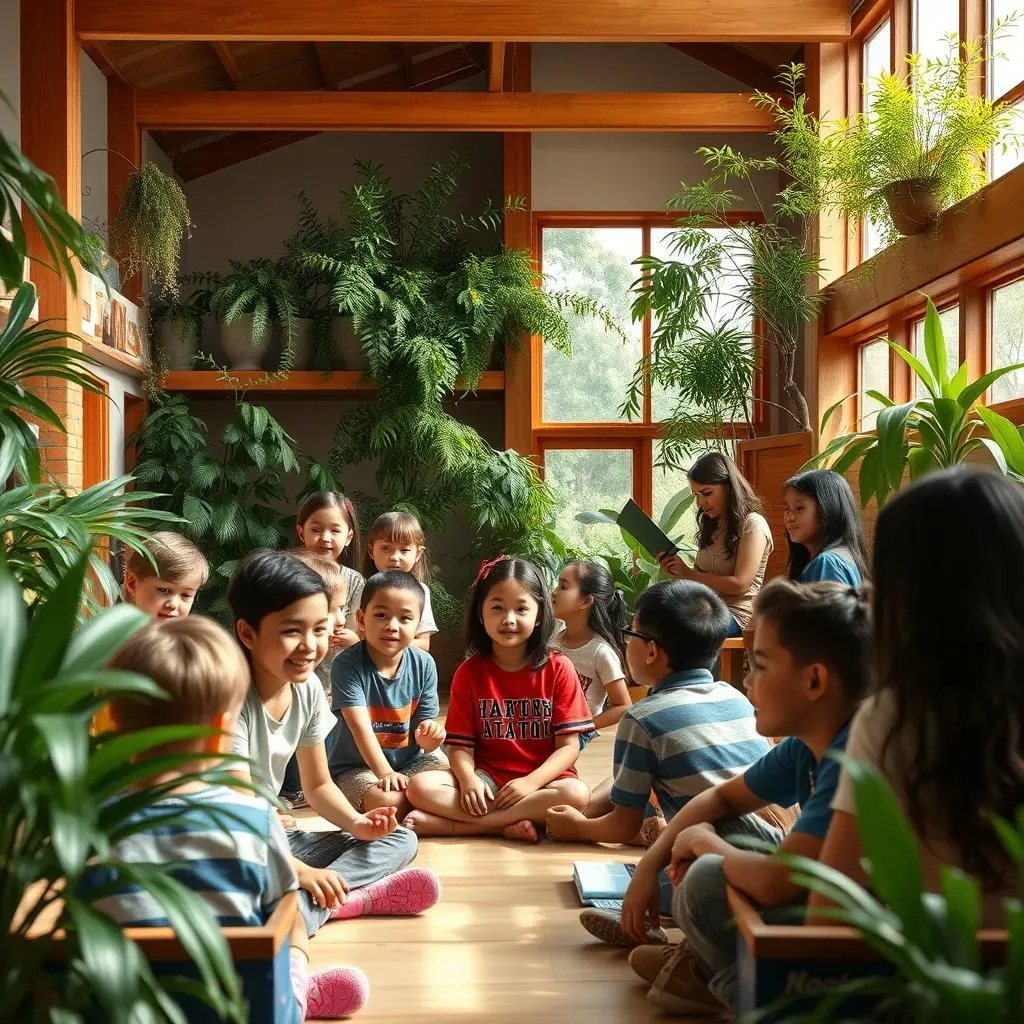Table of Contents
Are you exploring alternatives to traditional schooling? Maybe you're curious about a "homeschool campus" but aren't quite sure what it entails. It’s a fair question. The term might conjure images of a school building, but with a homeschool twist. This article will guide you through the ins and outs of a homeschool campus, which isn't just a classroom, it's a dynamic learning hub. We will explore what exactly a homeschool campus is, the advantages it offers over traditional homeschooling, and how to choose the right one that fits your family. Think of it as a roadmap to understanding how a homeschool campus could transform your child's educational journey. We'll cover everything from the structure of the campus to how it fosters community and supports your child's individual learning style. Ready to learn more? Let's get started, and unravel the unique world of the homeschool campus.
What is a Homeschool Campus?
What is a Homeschool Campus?
Beyond the Kitchen Table
so you've heard of homeschooling, right? It's where parents take charge of their kids' education at home. But a homeschool campus? That's like leveling up! It's a physical location where homeschoolers can gather for classes, activities, and community. Think of it as a hybrid between a traditional school and homeschooling. Instead of being stuck at the kitchen table all day, kids get to interact with others, learn from expert teachers, and explore a wider range of subjects in a structured environment. It's not just about academics; it's about creating a vibrant learning community.
It’s kind of like a co-op, but often with more resources and a more formal structure. Imagine a place where kids can take science labs, art classes, and maybe even learn coding, all while still enjoying the flexibility of homeschooling. It's a spot where parents can get a break from teaching every single subject and let others take the lead. These campuses can vary greatly, some might be small with just a few classes, while others are larger with a full range of offerings. It really just depends on what the community needs and what the campus is set up to provide.
Feature | Homeschooling | Homeschool Campus |
|---|---|---|
Location | Home | Designated Campus |
Instruction | Parents | Expert Teachers |
Socialization | Limited | Structured Group Activities |
Resources | Potentially Limited | Enhanced, Labs, Libraries |
More Than Just a Building
A homeschool campus is more than just a building; it's a hub for connection. It’s a place where kids can form friendships with other homeschoolers. It can be a lifeline for parents, offering a support network. It's not just about academics, it’s also about building a sense of community and belonging. It often hosts events, field trips, and other fun activities that traditional homeschoolers might miss out on.
These campuses really try to create an environment that is both educational and engaging. They often have specialized equipment, like science labs or art studios, that are hard to replicate at home. They also bring in teachers with expertise in specific areas, which can be a huge plus for parents who might not feel confident teaching every subject. It's like having all the benefits of a school, but with the flexibility and personalized approach of homeschooling. It’s a great option for families wanting a bit of both worlds.
"The best classroom is the world around us, and a homeschool campus helps us explore it with others." - A Homeschool Parent
Benefits of Choosing a Homeschool Campus
Benefits of Choosing a Homeschool Campus
so you’re thinking about a homeschool campus, and you’re wondering what’s the big deal? Well, let me tell you, there are quite a few perks. First off, there’s the social aspect. Homeschooling at home can sometimes feel a bit isolating, you know, just you and the textbooks. But a homeschool campus provides a ready-made community. It’s a place where kids can connect with peers who share similar educational experiences, and let's be real, that's a game changer. It gives them a chance to form friendships, collaborate on projects, and just have some good old fashioned social time. Plus, it's not just the kids who benefit, parents get to connect with other homeschooling families, creating a support system that can be a lifesaver during those tough days.
Another big plus? Access to resources and specialized instruction. Let's face it, not all parents are experts in every subject. I know I'm definitely not. A homeschool campus often has science labs, art studios, and other equipment that you might not have at home. Plus, they bring in teachers who are experts in their fields, so your kids are getting instruction from people who really know their stuff. This can be a huge relief for parents who might feel a little intimidated teaching, say, advanced chemistry or a foreign language. It really enhances your child's learning experience and opens up a world of new possibilities. It's like having the best of both worlds: the flexibility of homeschooling and the resources of a traditional school.
Benefit | Description |
|---|---|
Socialization | Opportunities to interact with peers and build friendships. |
Expert Instruction | Access to teachers who specialize in various subjects. |
Resources | Use of specialized equipment like science labs and art studios. |
Community Support | A network of other homeschooling families for support. |
And let's not forget about the structure and routine a homeschool campus can provide. Sometimes, homeschooling at home can be a little chaotic, I mean, we've all been there. A campus offers a structured schedule, classes at set times, and a clear curriculum, which can be a relief for both parents and kids. It helps to create a sense of normalcy and can make it easier to stay on track. It can also be a great way to prepare kids for future educational settings, like college, while still enjoying the personalized approach of homeschooling. It's about striking a balance between structure and flexibility, and a homeschool campus does that really well.
Finally, a homeschool campus can offer a wider range of extracurricular activities than you might be able to provide at home. Think sports teams, drama clubs, coding classes, and even field trips. These activities not only enrich your child's learning experience but also provide opportunities for personal growth and development. It's about creating well-rounded individuals, not just academic whizzes. It adds a whole new dimension to your child's homeschool experience, making it more engaging and fun.
"A homeschool campus isn't just a place to learn; it's a place to grow, connect, and thrive." - A Homeschool Campus Director
How to Select the Right Homeschool Campus for Your Family
How to Select the Right Homeschool Campus for Your Family
so you're sold on the idea of a homeschool campus, but now the big question is: how do you pick the right one? It's not like buying a pair of shoes, it's a big decision that impacts your child's education. First off, think about what your family needs. What are your child's strengths and weaknesses? What subjects are they really into? And what subjects do they maybe need a little more help with? Not all campuses are created equal, some focus more on arts, some on STEM, and some have a more general curriculum. It’s like finding the perfect pair of jeans, you need to know what you’re looking for.
Next, it's time to do some research. Look at the campus's website, read reviews, and if possible, visit in person. Pay attention to the facilities, are they well-maintained? Do they have the resources your child needs? Also, look at the teachers. What are their qualifications and experience? Do they seem like they would be a good fit for your child? And don't forget to ask about the campus's philosophy and values. Do they align with your own? It’s important to make sure your family feels comfortable and welcomed.
Consideration | Questions to Ask |
|---|---|
Curriculum | What subjects are offered? Are they aligned with your goals? |
Teachers | What are their qualifications? What is their teaching style? |
Facilities | Are there labs, art studios, libraries? Are they well-maintained? |
Philosophy | Does the campus's values align with your family's? |
Don't be shy about asking lots of questions. What's the class size? What's the schedule like? Are there opportunities for parent involvement? What kind of extracurricular activities do they offer? It's important to get a clear picture of what to expect, before you commit. Think of it like interviewing a potential employee, you want to make sure they're a good fit for the job, and in this case, the job is educating your child. So, take your time, and don't rush into a decision. The right campus will feel right for your family.
Finally, listen to your gut. Sometimes, you just get a feeling about a place. If something doesn’t feel right, don’t ignore it. Choosing a homeschool campus is a big decision, but it doesn't have to be overwhelming. With a little research and some careful consideration, you can find a campus that will be a great fit for your family. It's all about finding a place where your child can thrive, learn, and grow. It’s about finding a community that supports your family and makes your homeschooling journey a bit easier.
"Choosing the right homeschool campus is like finding the perfect puzzle piece – it fits just right and completes the picture." - A Homeschooling Expert
Wrapping Up Your Homeschool Campus Journey
Choosing the right educational path for your child is a big decision, and exploring the world of a homeschool campus can open doors to unique opportunities. From flexible learning environments to a vibrant sense of community, these campuses offer a blend of structured support and individualized learning. Remember, the key is finding a campus that aligns with your family's values and your child's needs. Whether you're drawn to the social aspect, the expert-led classes, or the freedom it provides, a homeschool campus can be a game-changer. Take your time, ask questions, and trust your instincts. The right homeschool campus is out there, waiting to help your child thrive.